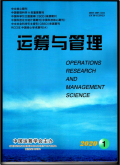运筹与管理2024,Vol.33Issue(2):22-28,7.DOI:10.12005/orms.2024.0039
乡村振兴背景下生鲜农产品上行集货路径优化研究
Routing Optimization of the Upward Pickup of Fresh Agricultural Products under the Background of Rural Development
摘要
Abstract
The first-mile pickup of agricultural products is an important part of the rural distribution system,and the pickup efficiency affects the economic cost of agricultural product transportation directly.With the develop-ment of social economy,the market has gradually increased the quality requirements of agricultural products,which brings new challenges to agricultural product upstream logistics.In the logistics system of agricultural products in the new era,controlling the cost of collecting goods,improving the efficiency of collecting goods,and reducing the loss of fresh agricultural products in the process of collecting goods will become the key control direction.Under the background of rural revitalization strategy,this study starts from the problem of first-mile pickup of agricultural products,and proposes targeted optimization schemes to improve the efficiency and quality of agricultural products. At present,most of the existing pickup methods are collected for all collection points one by one.However,in areas where agricultural products are grown in scattered areas,the cost of pickup of agricultural products for farmers in remote areas is relatively high,and due to the long transportation distance,the turbulence generated during transportation is likely to lead to a greater loss of the freshness of agricultural products.Therefore,the design considers the transportation mode of farmer cooperation,establishes the cooperation distance minimization model,realizes the cooperation matching of remote farmers,and adopts remote farmers to assist the central cargo collection vehicle for transportation. The cost generated in the process of fresh transportation is usually calculated as the driving cost of refrigera-ted vehicles,but because fresh agricultural products may be damaged due to vehicle bumps and handling bumps in the transportation process,and time changes,the freshness of fresh agricultural products will also suffer a certain loss,so when calculating transportation costs,the total cost shall include the transportation cost of refrig-erated vehicles,the cost of freshness loss of agricultural products,and the cost of collaboration of collaborative vehicles.With the aim of minimizing total cost,the optimization model of first-mile pickup of agricultural products is established,and an improved hybrid algorithm of saving mileage and tabu search is designed to solve the model.Tabu search algorithm has strong climbing ability and can accept inferior solutions during the search process,so it can jump out of the local optimal in the search process and increase the probability of obtaining the global optimal solution.However,due to the high sensitivity of the tabu search algorithm to the initial solution,the quality of the initial solution directly affects the convergence speed and the quality of the solution,so the mileage saving algorithm is used to generate the initial solution.It is then passed into the tabu search algorithm to obtain a higher quality solution. The case analysis shows that the improved mile-saving and tabu search hybrid algorithm designed in this paper can effectively solve the model,and the calculation results show that using cooperative vehicles to cooper-ate in cargo collection can greatly reduce the cargo collection range and mileage of central cargo collection vehi-cles,and can effectively reduce the total cost of cargo collection.关键词
生鲜物流/协作运输/匹配问题/车辆路径问题/启发式算法Key words
fresh logistics/cooperative transportation/matching problem/vehicle routing problem/heuristic algorithm分类
管理科学引用本文复制引用
葛显龙,杨斯然..乡村振兴背景下生鲜农产品上行集货路径优化研究[J].运筹与管理,2024,33(2):22-28,7.基金项目
国家社会科学基金资助项目(19CGL041) (19CGL041)

